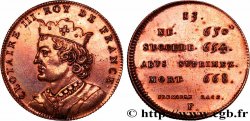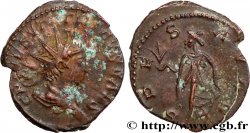E-auction 641-646366 - SÉRIE MÉTALLIQUE DES ROIS DE FRANCE Règne de HUGUES CAPET - 35 - refrappe ultra-moderne
得先注册又得到批准才可以报价。为了报价注册. 客户应该得到公司允许,那种过程需要 48 个小时。别等出售结束那一天才登记。您报价的话等于您赞成买那物品,而且按« 保价 » 证明您接受 cgb.fr 因特网拍卖使用法.
报价时只可以出全数值欧元总额。物品描述也说明销售结束时间,结束后出价都不会生效。 报价命令转达有时变动,等到最后秒钟增加否决的可能会。想多了解的话请注意 因特网拍卖常问
购货人不付费
购货人不付费
种类 Règne de HUGUES CAPET - 35 - refrappe ultra-moderne
日期: n.d.
材质 gilt bronze
直径 32 mm
模子方针 12 h.
重量 21,43 g.
侧面 cannelée
印模 corne d’abondance
关于品相的说明
Patine hétérogène avec des traces de manipulation et traces de rayures
正面
正面的文字 HUGUES CAPET ROY DE FRANCE.
正面的说明书 Buste imaginaire couronné et drapé à droite.
背面
背面的文字 35. / NÉ. 941*. / COURONNÉ. 987. / RETABLISSEMENT DE LA / DISCIPLINE ECCLESIASTIQUE. / MORT 996. / COMMENCEMENT DE LA / TROISIEME RACE. / P..
背面的说明书 Légende en 9 lignes et corne d’abondance à l’exergue.
评论
Médaille conservée sous capsule
Hugues Capet (né vers 940, mort au lieu-dit « Les Juifs », près de Prasville (Eure-et-Loir) le 24 octobre 996), duc des Francs (960-987), puis roi des Francs (987-996), fut le premier souverain de la dynastie capétienne. Fils de Hugues le Grand et de son épouse Hedwige de Saxe, il est l'héritier des puissants Robertiens, la lignée qui est en compétition pour le pouvoir avec la dynastie carolingienne et les grandes familles aristocratiques de Francie aux IXe et Xe siècles.
La fin du Xe siècle connaît le début d'une révolution économique et sociale qui allait trouver son apogée vers 1100 Les progrès agricoles, le début des défrichements et l'augmentation des capacités d'échanges entraînée par l'introduction du denier d'argent par les premiers Carolingiens, entraînent une dynamique économique encore timide mais réelle. Dans le même temps, la fin des invasions et la continuité des guerres personnelles entraînent la construction des premiers châteaux privés où peuvent trouver refuge les paysans. En parallèle, la nouvelle élite guerrière, les chevaliers, entre en concurrence avec l'ancienne aristocratie foncière carolingienne. Pour canaliser ces nouveaux venus et pour assurer la protection de leurs biens, l'aristocratie et l'Église soutiennent et exploitent le mouvement de la paix de Dieu. C'est dans ce contexte qu'Hugues Capet peut instaurer la dynastie capétienne.
Pour la suite de la biographie, voir http://fr.wikipedia.org/wiki/Hugues_Capet.
Medal preserved under capsule Hugues Capet (born around 940, died at the place called “Les Juifs”, near Prasville (Eure-et-Loir) on October 24, 996), Duke of the Franks (960-987), then King of the Franks (987-996), was the first sovereign of the Capetian dynasty. Son of Hugh the Great and his wife Hedwig of Saxony, he is the heir to the powerful Robertians, the line that competed for power with the Carolingian dynasty and the great aristocratic families of Francia in the 9th and 10th centuries..
The end of the 10th century saw the beginning of an economic and social revolution which would reach its peak around 1100. Agricultural progress, the beginning of land clearing and the increase in trading capacity brought about by the introduction of the silver denarius by the first Carolingians, led to an economic dynamic which was still timid but real.. At the same time, the end of invasions and the continuation of personal wars led to the construction of the first private castles where peasants could find refuge.. At the same time, the new warrior elite, the knights, entered into competition with the old Carolingian landed aristocracy.. To channel these newcomers and to ensure the protection of their property, the aristocracy and the Church supported and exploited the Peace of God movement.. It is in this context that Hugh Capet can establish the Capetian dynasty.
For the rest of the biography, see http://fr. Wikipedia. org/wiki/Hugues_Capet
Hugues Capet (né vers 940, mort au lieu-dit « Les Juifs », près de Prasville (Eure-et-Loir) le 24 octobre 996), duc des Francs (960-987), puis roi des Francs (987-996), fut le premier souverain de la dynastie capétienne. Fils de Hugues le Grand et de son épouse Hedwige de Saxe, il est l'héritier des puissants Robertiens, la lignée qui est en compétition pour le pouvoir avec la dynastie carolingienne et les grandes familles aristocratiques de Francie aux IXe et Xe siècles.
La fin du Xe siècle connaît le début d'une révolution économique et sociale qui allait trouver son apogée vers 1100 Les progrès agricoles, le début des défrichements et l'augmentation des capacités d'échanges entraînée par l'introduction du denier d'argent par les premiers Carolingiens, entraînent une dynamique économique encore timide mais réelle. Dans le même temps, la fin des invasions et la continuité des guerres personnelles entraînent la construction des premiers châteaux privés où peuvent trouver refuge les paysans. En parallèle, la nouvelle élite guerrière, les chevaliers, entre en concurrence avec l'ancienne aristocratie foncière carolingienne. Pour canaliser ces nouveaux venus et pour assurer la protection de leurs biens, l'aristocratie et l'Église soutiennent et exploitent le mouvement de la paix de Dieu. C'est dans ce contexte qu'Hugues Capet peut instaurer la dynastie capétienne.
Pour la suite de la biographie, voir http://fr.wikipedia.org/wiki/Hugues_Capet.
Medal preserved under capsule Hugues Capet (born around 940, died at the place called “Les Juifs”, near Prasville (Eure-et-Loir) on October 24, 996), Duke of the Franks (960-987), then King of the Franks (987-996), was the first sovereign of the Capetian dynasty. Son of Hugh the Great and his wife Hedwig of Saxony, he is the heir to the powerful Robertians, the line that competed for power with the Carolingian dynasty and the great aristocratic families of Francia in the 9th and 10th centuries..
The end of the 10th century saw the beginning of an economic and social revolution which would reach its peak around 1100. Agricultural progress, the beginning of land clearing and the increase in trading capacity brought about by the introduction of the silver denarius by the first Carolingians, led to an economic dynamic which was still timid but real.. At the same time, the end of invasions and the continuation of personal wars led to the construction of the first private castles where peasants could find refuge.. At the same time, the new warrior elite, the knights, entered into competition with the old Carolingian landed aristocracy.. To channel these newcomers and to ensure the protection of their property, the aristocracy and the Church supported and exploited the Peace of God movement.. It is in this context that Hugh Capet can establish the Capetian dynasty.
For the rest of the biography, see http://fr. Wikipedia. org/wiki/Hugues_Capet








 对产品描述纠错
对产品描述纠错 打印
打印 分享我的选择
分享我的选择 提问
提问 Consign / sell
Consign / sell
 产品介绍
产品介绍










